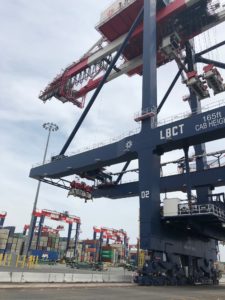Automation Leads To Efficiency Gains But Job Losses At Southern California Port
Controversial issue to be discussed at upcoming UCLA conference on zero-emission freight at Southern California’s ports

Automation threatens to eliminate many manufacturing jobs around the world, as robots now perform factory line tasks that used to be done by humans. Now the technology is starting to be deployed through self-driving vehicles in places like ports, with similar results.
It’s an issue we’ll discuss at the upcoming free UCLA/Berkeley Law conference on June 8th at UCLA on zero-emission freight at Southern California’s ports (featuring a keynote presentation by California Air Resources Board chair Mary Nichols).
Recently, I had an opportunity to tour the world’s first zero-emission marine container terminal at the Port of Long Beach (see photo). The terminal uses fully automated battery electric cargo handling equipment to move containers, with more than 60 lead acid battery electric units running in every day service.
Here is a video I took of the autonomous vehicles, which are pretty mesmerizing to see move on their own:
[youtube https://www.youtube.com/watch?v=z-rJJiKNtLM&w=560&h=315]
The entire project cost well over $1 billion to build and took years to secure all the permitting, according to port officials who led us on the tour. Despite the productivity gains, port leaders seem unlikely to expand the use of the technology anytime soon, given funding constraints.
Still, the terminal is not without controversy. Emily Guerin at KPCC radio in Los Angeles ran a piece that described the battle between labor unions and port officials over the project. These critical areas of freight typically offer some of the highest-paying union jobs around for longshoremen. But the terminal project led to layoffs due to the automation component.
The video below was shot by one of the laid off workers from the Long Beach port, and it shows in stark terms both the promise of autonomous, zero-emission technologies, as well as the human cost (warning: profanity included):
[youtube https://www.youtube.com/watch?v=fvrPcgM5cH4&w=560&h=315]
As port officials, policy makers, and advocates move toward cleaner freight at the ports, issues such as automation and workforce participation will play a major role in determining the technologies and implementation going forward.
To learn more on this and other issues related to sustainable freight at the ports, register today for the UCLA conference on June 8th (MCLE credit available).







Reader Comments